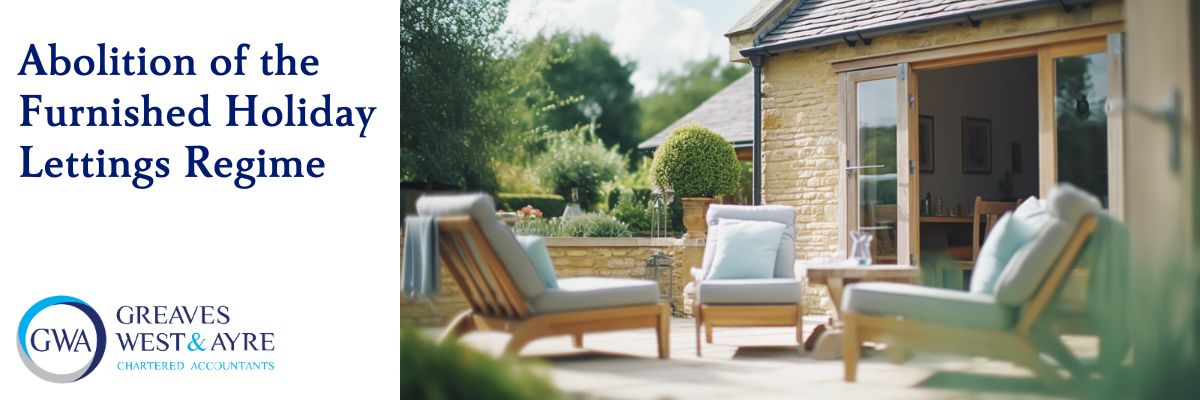Abolition of the Furnished Holiday Lettings Regime

The favorable tax regime for Furnished Holiday Lettings (FHLs) was first introduced in 1984. Forty years later, in the Spring 2024 Budget the then Chancellor of the Exchequer, Jeremy Hunt announced its abolition from 6 April 2025.
No further details were known at that time however following the General Election, the new Government have confirmed that they are to go ahead with the abolition and have published draft legislation and a policy paper setting out the changes.
The Old Regime
Under the old regime, landlords letting furnished holiday accommodation on a commercial basis benefited from more favourable tax rules to those landlords letting on longer term residential lets. Landlords were able to access various Capital Gains Tax reliefs available to traders, The interest relief restriction did not apply to FHLs with interest and finance costs being allowed in full, capital allowances were available to FHL landlords and the profits of an FHL business counted as relevant earnings for pension purposes.
To qualify for this regime, the property had to be in the UK or EEA and had to be let on a commercial basis. There were various tests which had to be met covering days actually let and days available to let.
The New Regime
From 6 April 2025, the FHL regime will be repealed, and all property income from both FHLs and normal residential letting will be treated the same as one ‘Property Business’ either a single UK business or a single overseas business.
FHL landlords will no longer be able to deduct interest and financial costs when calculating their taxable profits. Instead, they will receive relief as an Income Tax reduction of up to 20% (capped at the amount of the tax). Any unrelieved amounts can however be carried forward for relief in later tax years.
FHL landlords will no longer be able to claim capital allowances on such domestic items as appliances, furniture and furnishings. Instead, from 6 April 2025, relief will be given when the items are replaced, providing a deduction for the cost of a like-for-like replacement. Initial purchases of such items do not receive any relief; it is only the replacement of the items that receive the relief as with landlords letting property outside the FHL regime. However, current capital allowance pools will still be allowed to carry on past 5 April 2025, but no further purchases can be added.
The Capital Gains Tax reliefs currently afforded to FHL businesses are valuable, particularly Business Asset Disposal Relief (BADR) on the disposal of the business, reducing the rate at which Capital Gains Tax is charged to 10% compared to the top rate of 24% otherwise used where income and gains exceed the basic rate band. Now, where the date of cessation of the business and sale of property is after 6 April 2025, the normal rates of Capital Gains Tax on residential property will apply being 18% and 24%. There are transitional rules available preserving BADR where the business ceased before 6 April 2025, but the property sold within three years of the date of cessation.
Where a disposal of an FHL business is being considered and there are gains within the property portfolio, the landlord may consider ceasing their FHL business before 6 April 2025 to preserve access to BADR. This could save up to £14,000 in tax in every £100,000 of gain if they are thinking of exiting the industry soon.
FHL landlords also benefited from Capital Gains Tax roll-over relief and gift hold-over relief preventing the immediate capital gain being charged, delaying the point at which the charge crystalises. Both reliefs will be lost under the new regime. An anti-forestalling rule will be introduced to counter attempts to retain access to the existing Capital Gains Tax reliefs by the use of unconditional contracts.
FHL profits will no longer count towards the landlords Net Relevant Earnings for pension contribution purposes thus reducing the ability to make tax relievable contributions.
The ability to relieve losses will also be affected. Currently losses can only be carried forward against profits from the same property business but from 6 April 2025, the profits and losses from the different types of let will be amalgamated, providing relief for losses on FHLs against profits from a normal residential let and vice versa. Unused FHL losses as at 5 April 2025 will have the ability to be carried forward and used against the profits of the amalgamated business.
While the loss of the tax advantages is a blow to FHL landlords, there may be some positives too. The current FHL rules impose strict occupancy and availability tests which will no longer need to be met under the new regime providing landlords with much more flexibility as to how they use their property, allowing more personal use or say letting as an FHL in the summer months and on longer term lets over the winter or off season. The ability to relieve losses against other types of letting may also be of benefit.


